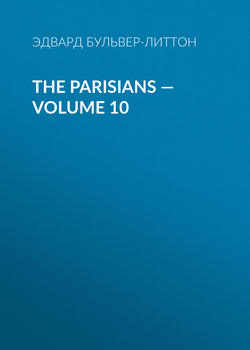Читать книгу The Parisians — Volume 10 - Эдвард Джордж Бульвер-Литтон, Эдвард Бульвер-Литтон - Страница 2
BOOK X CHAPTER II
ОглавлениеAmong things indescribable is that which is called "Agitation" in Paris— "Agitation" without riot or violence—showing itself by no disorderly act, no turbulent outburst. Perhaps the cafes are more crowded; passengers in the streets stop each other more often, and converse in small knots and groups; yet, on the whole, there is little externally to show how loudly the heart of Paris is beating. A traveller may be passing through quiet landscapes, unconscious that a great battle is going on some miles off, but if he will stop and put his ear to the ground he will recognise by a certain indescribable vibration, the voice of the cannon.
But at Paris an acute observer need not stop and put his ear to the ground; he feels within himself a vibration—a mysterious inward sympathy which communicates to the individual a conscious thrill—when the passions of the multitude are stirred, no matter how silently.
Tortoni's cafe was thronged when Duplessis and Frederic Lemercier entered it: it was in vain to order breakfast; no table was vacant either within the rooms or under the awnings without.
But they could not retreat so quickly as they had entered. On catching sight of the financier several men rose and gathered round him, eagerly questioning:
"What do you think, Duplessis? Will any insult to France put a drop of warm blood into the frigid veins of that miserable Ollivier?"
"It is not yet clear that France has been insulted, Messieurs," replied Duplessis, phlegmatically.
"Bah! Not insulted! The very nomination of a Hohenzollern to the crown of Spain was an insult—what would you have more?"
"I tell you what it is, Duplessis," said the Vicomte de Breze, whose habitual light good temper seemed exchanged for insolent swagger—"I tell you what it is, your friend the Emperor has no more courage than a chicken. He is grown old, and infirm, and lazy; he knows that he can't even mount on horseback. But if, before this day week, he has not declared war on the Prussians, he will be lucky if he can get off as quietly as poor Louis Philippe did under shelter of his umbrella, and ticketed 'Schmidt.' Or could you not, M. Duplessis, send him back to London in a bill of exchange?"
"For a man of your literary repute, M. le Vicomte," said Duplessis, "you indulge in a strange confusion of metaphors. But, pardon me, I came here to breakfast, and I cannot remain to quarrel. Come, Lemercier, let us take our chance of a cutlet at the Trois Freres."
"Fox, Fox," cried Lemercier, whistling to a poodle that had followed him into the cafe, and, frightened by the sudden movement and loud voices of the habitues, had taken refuge under the table.
"Your dog is poltron," said De Breze; "call him Nap." At this stroke of humour there was a general laugh, in the midst of which Duplessis escaped, and Frederic, having discovered and caught his dog, followed with that animal tenderly clasped in his arms.
"I would not lose Fox for a great deal," said Lemercier with effusion; "a pledge of love and fidelity from an English lady the most distinguished: the lady left me—the dog remains."
Duplessis smiled grimly: "What a thoroughbred Parisian you are, my dear Frederic! I believe if the tramp of the last angel were sounding, the Parisians would be divided into two sets: one would be singing the Marseillaise, and parading the red flag; the other would be shrugging their shoulders and saying, 'Bah! as if le Bon Dieu would have the bad taste to injure Paris—the Seat of the Graces, the School of the Arts, the Fountain of Reason, the Eye of the World;' and so be found by the destroying angel caressing poodles and making bons mots about les femmes."
"And quite right, too," said Lemercier, complacently; "what other people in the world could retain lightness of heart under circumstances so unpleasant? But why do you take things so solemnly? Of course there will be war idle now to talk of explanations and excuses. When a Frenchman says, 'I am insulted,' he is not going to be told that he is not insulted. He means fighting, and not apologising. But what if there be war? Our brave soldiers beat the Prussians—take the Rhine—return to Paris covered with laurels; a new Boulevard de Berlin eclipses the Boulevard Sebastopol. By the way, Duplessis, a Boulevard de Berlin will be a good speculation—better than the Rue de Louvier. Ah! is not that my English friend, Grarm Varn?" here, quitting the arm of Duplessis, Lemercier stopped a gentleman who was about to pass him unnoticing. "Bon jour, mon ami! how long have you been at Paris?"
"I only arrived last evening," answered Graham, "and my stay will be so short that it is a piece of good luck, my dear Lemercier, to meet with you, and exchange a cordial shake of the hand."
